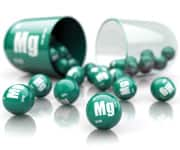Life Extension Magazine®
Cardiovascular disease remains the leading cause of death in the U.S. and worldwide.1,2
It’s been that way despite billions of dollars spent developing drugs and surgical treatments.
But there’s a simple way to help lower the risk: increasing intake of the mineral magnesium.3,4
One large epidemiological study of older men showed that those with the highest magnesium blood levels had a 44% lower risk of heart failure than those with the lowest magnesium levels.5
Most Americans fail to consume enough magnesium.
An estimated 64% of all men and 67% of all women are magnesium deficient. After age 71, those magnesium deficient numbers rise to 81% of men and 82% of women.3,6
It’s difficult to get enough magnesium from food alone. We also have trouble absorbing magnesium as we age.
Fortunately, supplementation with magnesium can resolve magnesium deficiency, and contribute to improved health and longevity.
Low Magnesium Increases Heart Disease Risk

Magnesium is a mineral involved in approximately 80% of known metabolic functions.7
Insufficient magnesium in the body means that enzymes required for proper metabolism function poorly or not at all.3
Many of these enzyme systems serve essential purposes in heart muscle and blood vessels. When they become impaired, the risk of cardiovascular disease rises.3
For nearly two decades, scientists have recognized that magnesium intake and magnesium blood levels influence formation of atherosclerosis.
Magnesium supplementation can inhibit atherosclerotic plaque formation in animals on high-fat diets.8
More recent human studies have revealed strong associations between low magnesium levels and higher heart disease risks. This demonstrates that magnesium can be a powerful protective measure to maintain heart health.3
Studies specifically show that the lower the dietary intake of magnesium, the higher the levels of:
-
Chronic, low-grade inflammation. This is a contributor to most age-related diseases.
Endothelial dysfunction. This occurs when the cells lining blood vessels (endothelial cells) become damaged and initiate and promote formation of artery-blocking lesions.9,10
Chronic inflammation and endothelial dysfunction both raise the risk of cardiovascular disease.9,10 Higher magnesium intake correlates with lower blood markers of inflammation and endothelial dysfunction.9
An epidemiological study of 3,523 men aged 60-79, with no prior history of cardiovascular disease, demonstrated that risk for heart failure declined steadily with rising magnesium levels.5
Those with the highest magnesium blood levels had a 44% lower risk of heart failure than those with the lowest levels, mostly due to the reduced markers of inflammation and endothelial dysfunction.5
Lab studies also show that, in cultured human endothelial cells, magnesium deficiency activates NF-kB (nuclear factor kappa B). NF-kB is a leading regulator of inflammation in cells and is a major facilitator of atherosclerosis.11
 |
What You Need to Know
Magnesium and Cardiovascular Disease Risk
-
Magnesium, the fourth most-common mineral in our bodies, is emerging as a critical determinant of heart and blood vessel health.
-
More than 80% of those over 71 have magnesium deficiency, risking serious cardiovascular events.
Lab studies show that magnesium reduces chronic inflammation and improves endothelial function, two major risk factors for cardiovascular disease.
Animal and human studies show that regular supplementation with magnesium can lower blood pressure, promote arterial relaxation, and fight arterial calcification.
What Animal Studies Show
Studies in animals have clearly shown the cardiovascular benefits of magnesium supplementation.
In rats, magnesium deficiency raised blood pressure and thickened major arteries, compared to rats with normal magnesium intake. This effect was most pronounced in older animals.12,13 In fact, the magnesium-deficient rats had significantly higher death rates, mostly related to high blood pressure.13
On the other hand, rats supplemented with magnesium had lower blood pressure. As a result, they were less likely to die than their magnesium-deficient peers.13
And in mice genetically prone to very high cholesterol levels, magnesium-supplemented animals had significantly smaller areas of atherosclerotic plaque than un-supplemented animals, because magnesium reduced blood cholesterol and triglyceride levels.8
These studies suggest that magnesium supplementation can help lower blood pressure and lipid levels.
These effects are seen even more dramatically in lab experiments done on intact arterial segments in “organ bath” preparations, which isolate the part of the body being studied.
In these studies, when magnesium was added to the organ bath it triggered:
Dilation (relaxation) of coronary arteries that had been damaged by insufficient oxygen. This damage to the arteries that supply blood to the heart is called hypoxia, and is often seen before a heart attack. Magnesium enhances the production of nitric oxide in the body, which naturally relaxes the arteries, increasing blood flow and reducing heart attack risk.14
Enhanced dilation of pulmonary arteries (which carry blood from the heart to the lungs) damaged by hypoxia. Poor pulmonary artery relaxation is a factor in heart failure.15
Reduced accumulation of calcium in segments of rat aortas, compared with segments not treated with magnesium.16 Calcification of major arteries is a significant contributor to arterial stiffness and reduced blood flow that leads to heart attacks and strokes.
 |
MAGNESIUM SUPPLEMENTS VARY
There is no single “optimal” form of magnesium for supplementation. Instead, it is important to consider the reason for the supplement.
One approach for ideal magnesium supplementation is to use a two-part supplement composed partly of magnesium citrate in a quick-release form and magnesium oxide in an extended-release form.
Magnesium oxide is highly concentrated, allowing a lot of magnesium to go into a relatively small pill. Because magnesium oxide is somewhat less bioavailable, it is ideal for an extended-release formulation, which gradually makes its way into the circulation.
Magnesium citrate, on the other hand, is less concentrated but is highly bioavailable, which allows for quick release of the mineral in a form that is readily absorbed.
This kind of innovative combination provides extended magnesium benefits in a single supplement.
Results of Human Studies
Human trials show that magnesium supplementation plays a part in prevention or mitigation of several dangerous cardiovascular disorders.
Endothelial dysfunction drives up blood pressure and precedes potentially fatal disorders like atherosclerosis, heart attack, stroke, and heart failure. Diuretic drugs, the first-line hypertension treatment, can trigger magnesium loss in urine, which aggravates the very problems they are meant to solve.17
Magnesium supplementation has been shown to help prevent these changes.
In a group of hypertensive women, ages 40-65, on diuretic therapy, oral magnesium-supplementation (600 mg/day) reduced blood pressure, lowering systolic (top number) pressure to 134 from 144 mmHg, and diastolic (lower number) pressure to 81 from 88, after six months of therapy.17
This result was linked to increased blood vessel dilation and significant improvements in endothelial function in supplemented women.
In addition, the thickness of the carotid artery, a measure of unhealthy arterial thickening, rose in placebo patients during the six-month period, but was unchanged in supplemented subjects.
A 2018 meta-analysis found that magnesium supplementation improved endothelial function.18
Coronary artery disease occurs when the arteries to the heart muscle develop atherosclerotic plaques, reducing blood flow and raising the imminent risk of heart attack.
Magnesium supplementation improves both heart function and exercise tolerance in people with coronary artery disease. In a study of 53 men suffering from the ailment, 365 mg of oral magnesium citrate taken twice daily for six months resulted in improved oxygen utilization during exercise and greater pumping action of the left ventricle (main pumping chamber) in the heart. This indicates significant improvements in blood flow and oxygen delivery.19
Heart failure is defined as the inability of the heart muscle to pump sufficient blood to meet bodily needs. It often arises in people who’ve had a heart attack. It can eventually result in the failure of multiple organs and death.
In a study of 22 patients with symptomatic chronic heart failure, an 800 mg/day dose of magnesium for three months produced a significant increase in arterial compliance (a measure of how well an artery can relax and contract in response to blood flow).20
This indicates improved endothelial function and improved ability of the arteries to deliver oxygen-rich blood to target organs.
 |
A Summary of Magnesium’s Effects on Cardiovascular Health
Cardiovascular disease and its risk factors are complex disorders, with many interwoven threads leading to potentially catastrophic outcomes.
Here’s a summary of what is known about magnesium’s effects on the heart and blood vessels.
Magnesium:3,21
Naturally counteracts ill effects of calcium in arterial walls, preventing calcium deposition and maintaining vessel elasticity,
Promotes production of signaling molecules that trigger vessel dilation (relaxation) to permit increased blood flow,
Balances effects of acute and chronic stress by modulating the impact of stress-response signaling molecules,
Regulates turnover of proteins in vessel walls that determine elasticity and flexibility, properties that are lost as atherosclerosis progresses,
Modulates electrical signaling in the heart muscle to enhance its contractility (“squeeze”),
Reduces risk factors for thrombosis (clotting inside arteries that blocks blood flow), and
Regulates migration of cells in arterial walls that overgrow in atherosclerosis, thereby reducing arterial thickness and stiffening.
These properties help to explain why humans with low magnesium intake or blood levels have higher risks for atherosclerosis, coronary artery disease, arrhythmias, and heart failure.21
Summary

Scientists have determined that having low magnesium levels increases the risk for conditions that are major risk factors for heart disease and strokes.
New evidence reveals that magnesium lowers cardiovascular risk through reductions in inflammation and improvements in endothelial function.
Magnesium boosts output of vessel-relaxing factors, including nitric oxide, and combats factors that narrow and harden arteries and restrict blood flow. Magnesium also fights the calcification that stiffens arteries.
Human studies demonstrate that regular magnesium supplementation has favorable effects on:
- Blood pressure,
- Coronary artery disease, and
- Heart failure.
Higher magnesium consumption, via diet or supplementation, has been demonstrated to provide numerous benefits, including lowering cardiovascular disease risk.
If you have any questions on the scientific content of this article, please call a Life Extension® Wellness Specialist at 1-866-864-3027.
References
- Available at: https://www.who.int/news-room/fact-sheets/detail/the-top-10-causes-of-death. Accessed September 13, 2019.
- Available at: https://www.cdc.gov/nchs/fastats/leading-causes-of-death.htm. Accessed September 13, 2019.
- Kostov K, Halacheva L. Role of Magnesium Deficiency in Promoting Atherosclerosis, Endothelial Dysfunction, and Arterial Stiffening as Risk Factors for Hypertension. Int J Mol Sci. 2018 Jun 11;19(6).
- Ismail A, Ismail N. Magnesium: A mineral essential for heatlh yet generally underestimated or even ignored. J. Nutr. Food Sci. 2016;6(2).
- Wannamethee SG, Papacosta O, Lennon L, et al. Serum magnesium and risk of incident heart failure in older men: The British Regional Heart Study. Eur J Epidemiol. 2018 Sep;33(9):873-82.
- Qu X, Jin F, Hao Y, et al. Magnesium and the risk of cardiovascular events: a meta-analysis of prospective cohort studies. PLoS One. 2013;8(3):e57720.
- Workinger JL, Doyle RP, Bortz J. Challenges in the Diagnosis of Magnesium Status. Nutrients. 2018;10(9):1202.
- Ravn HB, Korsholm TL, Falk E. Oral magnesium supplementation induces favorable antiatherogenic changes in ApoE-deficient mice. Arterioscler Thromb Vasc Biol. 2001 May;21(5):858-62.
- Chacko SA, Song Y, Nathan L, et al. Relations of dietary magnesium intake to biomarkers of inflammation and endothelial dysfunction in an ethnically diverse cohort of postmenopausal women. Diabetes Care. 2010 Feb;33(2):304-10.
- Song Y, Li TY, van Dam RM, et al. Magnesium intake and plasma concentrations of markers of systemic inflammation and endothelial dysfunction in women. Am J Clin Nutr. 2007 Apr;85(4):1068-74.
- Ferre S, Baldoli E, Leidi M, et al. Magnesium deficiency promotes a pro-atherogenic phenotype in cultured human endothelial cells via activation of NFkB. Biochim Biophys Acta. 2010 Nov;1802(11):952-8.
- Laurant P, Hayoz D, Brunner HR, et al. Effect of magnesium deficiency on blood pressure and mechanical properties of rat carotid artery. Hypertension. 1999 May;33(5):1105-10.
- Adrian M, Chanut E, Laurant P, et al. A long-term moderate magnesium-deficient diet aggravates cardiovascular risks associated with aging and increases mortality in rats. J Hypertens. 2008 Jan;26(1):44-52.
- Volpe MA, Carneiro JJ, Magna LA, et al. The role of magnesium in the endothelial dysfunction caused by global ischemia followed by reperfusion: in vitro study of canine coronary arteries. Scand Cardiovasc J. 2003 Sep;37(5):288-96.
- Mu YP, Huang QH, Zhu JL, et al. Magnesium attenuates endothelin-1-induced vasoreactivity and enhances vasodilatation in mouse pulmonary arteries: Modulation by chronic hypoxic pulmonary hypertension. Exp Physiol. 2018 Apr 1;103(4):604-16.
- Salem S, Bruck H, Bahlmann FH, et al. Relationship between magnesium and clinical biomarkers on inhibition of vascular calcification. Am J Nephrol. 2012;35(1):31-9.
- Cunha AR, D’El-Rei J, Medeiros F, et al. Oral magnesium supplementation improves endothelial function and attenuates subclinical atherosclerosis in thiazide-treated hypertensive women. J Hypertens. 2017 Jan;35(1):89-97.
- Darooghegi Mofrad M, Djafarian K, Mozaffari H, et al. Effect of magnesium supplementation on endothelial function: A systematic review and meta-analysis of randomized controlled trials. Atherosclerosis. 2018 Jun;273:98-105.
- Pokan R, Hofmann P, von Duvillard SP, et al. Oral magnesium therapy, exercise heart rate, exercise tolerance, and myocardial function in coronary artery disease patients. Br J Sports Med. 2006 Sep;40(9):773-8.
- Fuentes JC, Salmon AA, Silver MA. Acute and chronic oral magnesium supplementation: effects on endothelial function, exercise capacity, and quality of life in patients with symptomatic heart failure. Congest Heart Fail. 2006 Jan-Feb;12(1):9-13.
- Tangvoraphonkchai K, Davenport A. Magnesium and Cardiovascular Disease. Adv Chronic Kidney Dis. 2018 May;25(3):251-60.

